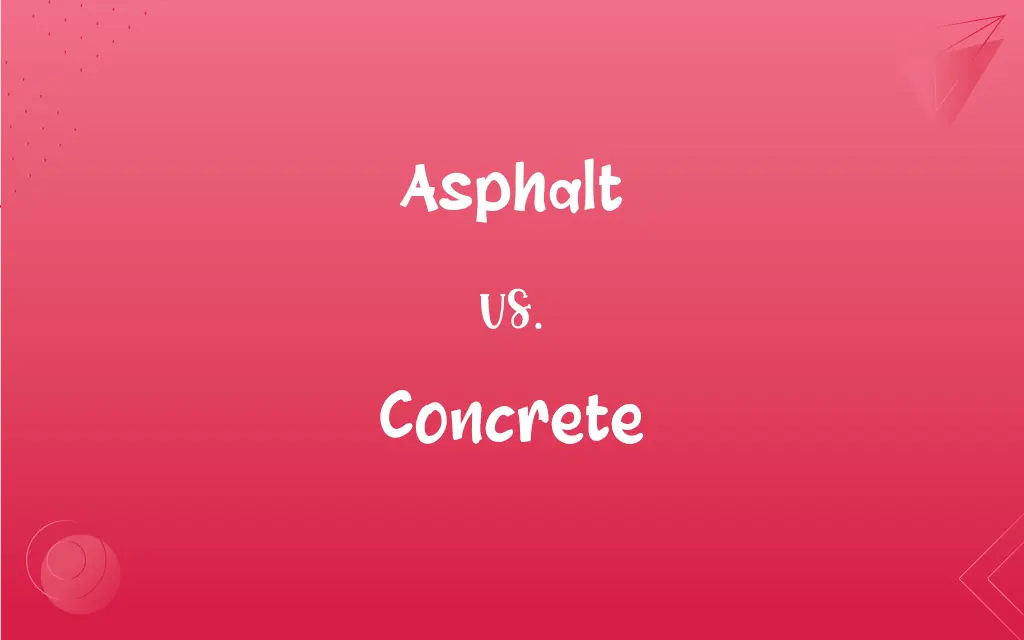Asphalt vs. Concrete: What's the Difference?
Edited by Janet White || By Harlon Moss || Updated on October 24, 2023
Asphalt is a black, sticky substance primarily used for road surfaces, while concrete is a mixture of cement, aggregate, and water used for construction.

Key Differences
Asphalt, derived mainly from petroleum, offers a black and somewhat flexible surface, often associated with roadways. Concrete, however, is a gray, rigid material composed of cement, water, and aggregates like sand or gravel.
When it comes to application, asphalt typically requires a heated process to lay and set, and it can be resurfaced relatively easily. In contrast, concrete is mixed and poured at ambient temperatures, and once it sets, any repairs or changes become more challenging.
Lifespan and maintenance also distinguish these materials: asphalt surfaces might need more frequent maintenance, like sealing, to prolong their life, while concrete, with its sturdy nature, can last for decades with minimal upkeep. However, concrete can be more susceptible to cracks, especially in regions with freeze-thaw cycles.
Though both asphalt and concrete are prevalent in construction, they possess distinct properties, making each suitable for specific applications.
Comparison Chart
Composition
Derived from petroleum.
Mixture of cement, water, and aggregates.
ADVERTISEMENT
Color & Appearance
Black and somewhat flexible.
Gray and rigid.
Application & Setting
Heated process; can be resurfaced easily.
Poured at ambient temperatures; hard to modify after setting.
Lifespan & Maintenance
Requires frequent maintenance.
Long-lasting with minimal upkeep.
Reaction to Environmental Stress
Can soften in extreme heat.
Susceptible to cracks in freeze-thaw cycles.
Asphalt and Concrete Definitions
Asphalt
A black, viscous material used in road construction.
They repaved the main street with fresh asphalt.
ADVERTISEMENT
Concrete
Sets into a rigid, rock-like mass.
After 24 hours, the concrete had hardened completely.
Asphalt
Commonly used for its flexibility and ease of repair.
The driveway's asphalt surface was patched up after the winter.
Concrete
A construction material made of cement, water, and aggregates.
The workers poured concrete to form the building's foundation.
Asphalt
Can soften and become tacky in high temperatures.
During the summer heat, the asphalt on the playground melted slightly.
Concrete
Known for its strength and durability.
The bridge, made of reinforced concrete, has stood for over a century.
Asphalt
Derived primarily from petroleum refining.
The plant processes crude oil to produce asphalt and other products.
Concrete
Used in various applications from buildings to roads.
The city opted for concrete barriers along the highway.
Asphalt
Requires sealing to extend its lifespan.
Every few years, they seal the asphalt to protect against wear.
Concrete
Susceptible to cracks if not properly mixed or cured.
Due to poor installation, cracks appeared on the concrete patio.
Asphalt
See bitumen.
Concrete
Of or relating to an actual, specific thing or instance; particular
Had the concrete evidence needed to convict.
FAQs
Which lasts longer, asphalt or concrete?
Concrete typically has a longer lifespan than asphalt when maintained properly.
Which is more environmentally friendly, asphalt or concrete?
Both have environmental impacts, but asphalt can be recycled more easily than concrete.
Is asphalt only black?
Asphalt is naturally black, but sealers or coatings can alter its appearance.
How often should asphalt roads be resurfaced?
It varies, but asphalt roads generally need resurfacing every 10-20 years.
What is the primary use of asphalt?
Asphalt is primarily used for road construction and paving.
Can concrete be colored or stamped?
Yes, concrete can be colored, stamped, or textured for decorative purposes.
Why does asphalt sometimes become soft in the sun?
Asphalt can soften in high temperatures because of its petroleum-based composition.
Can cracks in asphalt be repaired?
Yes, asphalt cracks can be sealed or patched as part of regular maintenance.
How is concrete made?
Concrete is made by mixing cement, water, and aggregates such as sand or gravel.
Why does concrete crack?
Concrete can crack due to various reasons, including shrinkage, temperature changes, or ground movement.
Can concrete be recycled?
Yes, concrete can be crushed and reused in some applications.
Are there different types of concrete?
Yes, there are various types of concrete based on mixtures, purposes, and reinforcements.
Is asphalt cheaper than concrete?
Generally, asphalt is less expensive initially, but long-term maintenance costs might be higher than concrete.
What's the main ingredient in concrete?
The primary ingredient in concrete is cement, which binds the aggregates together.
How long does it take for concrete to cure?
Concrete can take up to 28 days to fully cure, depending on conditions.
Is asphalt waterproof?
Asphalt is water-resistant, but not entirely waterproof.
How is concrete strength measured?
Concrete strength is typically measured in pounds per square inch (psi).
What is the texture of asphalt?
Asphalt is usually smooth but can be textured depending on its application.
Why is asphalt sometimes referred to as bitumen?
Bitumen is the liquid binder in asphalt; hence, the terms are sometimes used interchangeably outside of the U.S.
Can concrete resist fire?
Yes, concrete is inherently fire-resistant.
About Author
Written by
Harlon MossHarlon is a seasoned quality moderator and accomplished content writer for Difference Wiki. An alumnus of the prestigious University of California, he earned his degree in Computer Science. Leveraging his academic background, Harlon brings a meticulous and informed perspective to his work, ensuring content accuracy and excellence.
Edited by
Janet WhiteJanet White has been an esteemed writer and blogger for Difference Wiki. Holding a Master's degree in Science and Medical Journalism from the prestigious Boston University, she has consistently demonstrated her expertise and passion for her field. When she's not immersed in her work, Janet relishes her time exercising, delving into a good book, and cherishing moments with friends and family.
































































